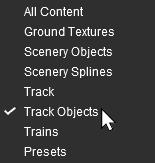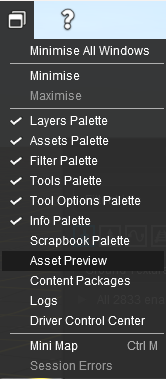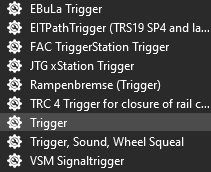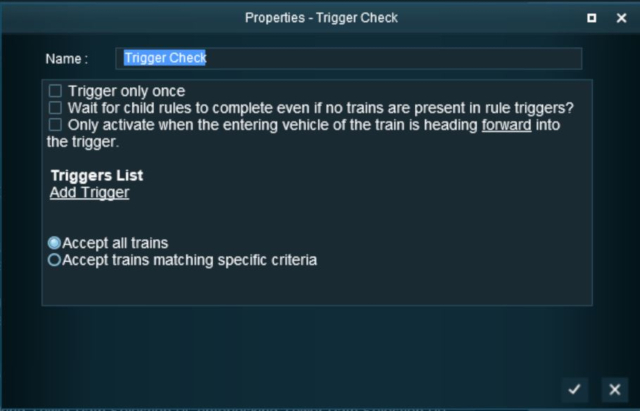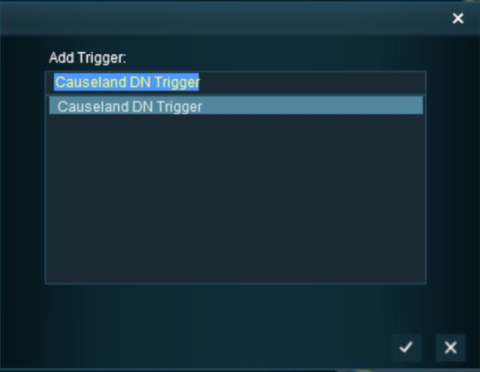The information in this Wiki Page applies to TANE, TRS19, Trainz Plus and TRS22.
|
|
 |
Track Triggers are markers that are invisible in Driver but visible in Surveyor |
 |
They are used to activate some Session Rules and Driver Commands |
 |
They can be placed in a Route layer or in a Session layer |
|
Track triggers can be programmed to respond when a train (any train or a specific train) passes over them in Driver Mode. The response comes from executing a set of Session Rules that have been attached to a  Trigger Check Rule (or a similar rule) or a Driver Command that is monitoring the trigger. Trigger Check Rule (or a similar rule) or a Driver Command that is monitoring the trigger. |
Shown below left is a standard Trigger and below right is a Directional Trigger. They are just two examples of several types of track triggers. In both cases:-
 |
they are visible in Surveyor and invisible in Driver |
 |
the "green wings" show their Effect Radius, the region where a consist will trigger an "event". The number in brackets show that radius in metres
 |
the Directional Trigger will normally only be triggered if the consist is moving in the direction indicated by the arrow |
 |
the standard Trigger will be triggered regardless of the direction of movement |
|
|
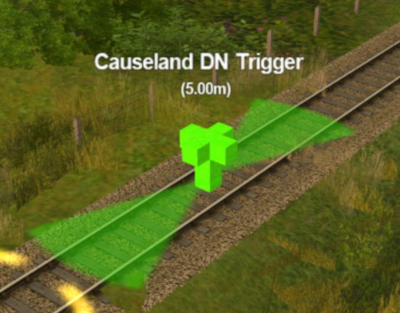
"Standard" Trigger |
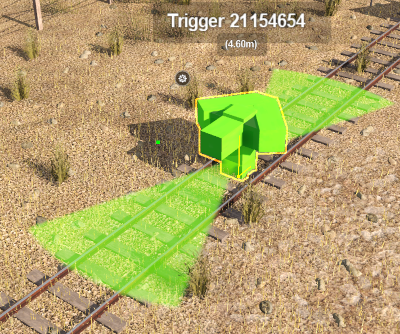
Directional Trigger |
|
 |
Triggers can be placed in a Route Layer or in a Session Layer |
 |
Notes:
|
 |
Placing Triggers in a Route layer (e.g. in the same layer as the track) means that they will be available in all Sessions created using that particular Route |
 |
Placing Triggers in a Session layer means that they will only be available in that Session. This can be useful if two or more Sessions are being created and you want to use different triggers in each Session |
|
 |
Information on Route and Session layers can be found at:-
|
In Surveyor Classic (S10)
|
 |
 |
|
|
|
|
Adding a Trigger (S10)
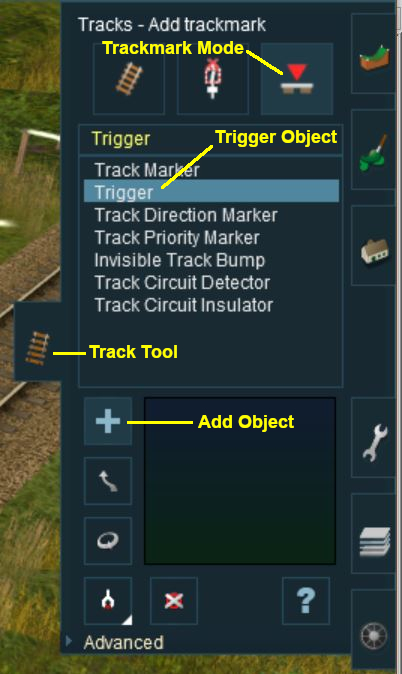 |
| Steps: To add a Trigger:- |
 |
Open the Tracks Tool Flyout or press the F4 key |
 |
Left Click on the Trackmark Mode button or press the V key |
 |
Left Click on the Trigger shown in the asset list |
 |
Left Click the + Add Object button - it may already be selected - or press the A key |
 |
Left Click on the track location where the Trigger is to be placed |
| This will place the Trigger on the track and open its properties window. |
|
|
| As soon as a new trigger has been placed, its properties window will open on the screen. It will initially be given a default name and assigned to the currently active layer. |
Set the Trigger Name and Layer (S10)
 |
To change the trigger name Left Click on the name text entry box, delete the highlighted default name and enter a new name |
 |
To change its assigned layer Left Click on the layer text entry box (or use its scroll arrowheads) and select a new layer - see the Trainz Wiki Page  How to Use layers for more details on layers How to Use layers for more details on layers |
 |
To confirm the changes Left Click on the  icon or the Save Changes button (depending on your Trainz version) at the bottom of the window icon or the Save Changes button (depending on your Trainz version) at the bottom of the window |
|
Set the Effect Radius (S10)
At the bottom of the Track Tools flyout menu is an Advanced button. Left Click this button to open the advanced tools.
| The Effect Radius sets the size of green "effect wings" attached both ends of the Trigger. This sets how close a consist has to approach to trigger its "event". The smaller the radius the closer it must approach. |
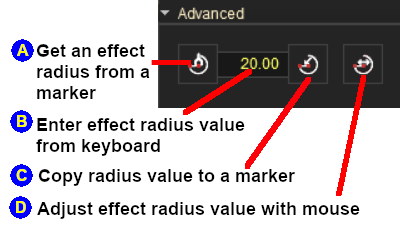 |
| Steps: To set a Triggers Effect Radius:- |
 |
In the Track Tools flyout, Left Click on the Advanced button to open the Radius tools and properties. You will have a choice of 4 methods to set and adjust the Effect Radius |
| Options: Choose one of:- |
 |
To copy the Effect Radius of an existing Trigger
 |
Left Click the Get Effect Radius icon |
 |
Left Click on the Trigger whose radius you want to copy - the radius will be copied into the Effect Radius Value text box (the default value is 20.00 metres) |
 |
To apply the new value see option  below below |
|
 |
To manually alter the Effect Radius value
 |
Type the new value (in metres) into the Effect Radius Value text box |
 |
To apply the new value see option  below below |
|
 |
To apply a value in the Effect Radius Value text box (from methods  , ,  or or  ) to another Trigger ) to another Trigger
 |
Left Click the Copy Radius Value icon |
 |
Left Click on the Trigger that is to receive the new value (you can click on more than one) |
|
 |
To adjust the Effect Radius value up or down
 |
Left Click the Adjust Effect Radius button |
 |
Select the Trigger |
 |
Left Click and Drag Forward (to increase the value) or Backward (to reduce the value) |
 |
The new value will be immediately applied to the selected Trigger as the mouse moves (but only one Trigger at a time) |
|
|
|
|
 |
Once you have an Effect Radius entered in the value box, you can apply it to any number of Triggers by using method  shown above shown above
|
|
In Surveyor 2.0 (S20)
|
 |
 |
|
|
|
|
| Surveyor 2.0 is only available in Trainz Plus and TRS22 Platinum |
|
Adding a Trigger (S20)
 In the Filter Palette either:-
In the Filter Palette either:-
 Left Click on the Track Objects icon Left Click on the Track Objects icon
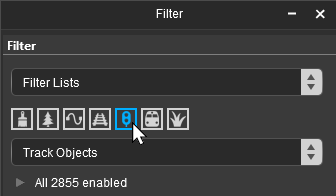
|
|
OR |
|
|
 Shortcut Shortcut
If you already have a Trigger placed in your route then:- |
 |
move the tool pointer over the existing trigger object and hold down the Alt key. The object name will appear in a ToolTip attached to the pointer |
 |
while holding down the Alt key Left Click on the trigger to identify it in the Assets Palette and to select the Placement Tool. Release the key. |
Jump to Step  below. below. |
|
 In the Assets Palette to narrow down the filter list, type "trigger" (UPPER/lower case does not matter) in the Search Text Box
In the Assets Palette to narrow down the filter list, type "trigger" (UPPER/lower case does not matter) in the Search Text Box
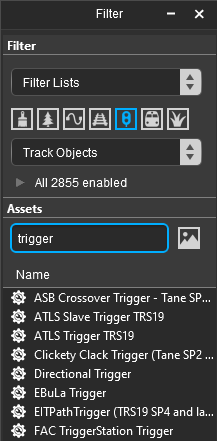
Both pallets shown docked |
|
 Place the Trigger on the track.
Place the Trigger on the track.
 |
If you need to rotate the Trigger to face the opposite direction then:-
| Steps: |
 |
select the Trigger then Left Click on its Context Menu Icon (or press the T key) |
 |
from the popup menu select the Rotate Trackside option |
|
| Note: the direction it faces has no effect on its operation |
|
Change Its Name (S20)
The name of the Trigger IS important. It is needed to identify the Trigger in Session Rules.
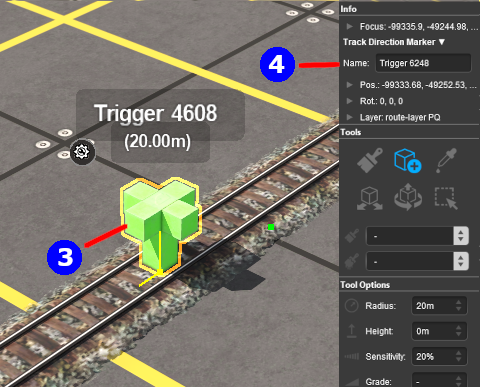 |
| Steps: To change the name of a Trigger:- |
 |
using either the Free Move Tool or the Fine Adjustment Tool select (Left Click on) the Trigger to be renamed |
 |
in the Info Palette (you may need to make this palette visible - see the Notes: for Step 1 above) Left Click in the Name: entry box. Enter a name for the Trigger and press the Enter key |
|
|
Set its Effect Radius (S20)
| The Effect Radius sets the size of green "effect wings" attached both ends of the Trigger. This sets how close a consist has to approach to trigger its "event". The smaller the radius the closer it must approach. |
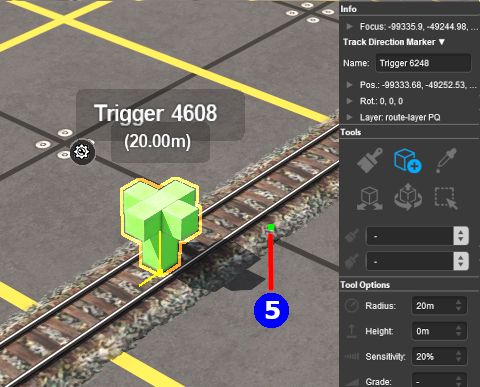 |
| Steps: To adjust the effect radius of a Trigger:- |
 |
Left Click and Drag Forward or Backward on the Green Dot next to the Trigger to increase or reduce its Effect Radius
 |
For the best results when adjusting the Effect Radius of any track object, move your camera POV (point of view) to directly above the object |
|
|
|
Move a Trigger Along the Track (S20)
Triggers can be moved along the track or to other tracks.
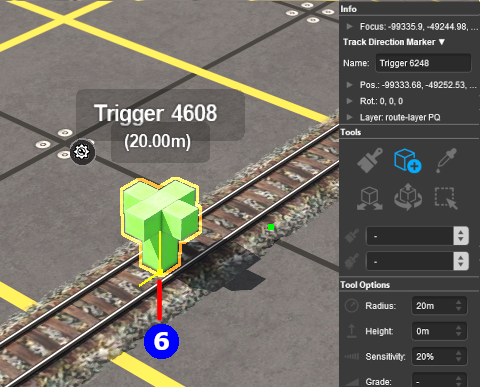 |
| Steps: To move the Trigger:- |
 |
Left Click and Drag Forward or Backward on the Yellow Dot next to the Trigger to move it along the track or to another track |
|
|
Move the Trigger Vertically (S20)
| Triggers can be physically placed above (or below) the track. This feature allows them to be placed, for example, above the track so that they will not be hidden in Surveyor if a consist is parked on the Trigger. |
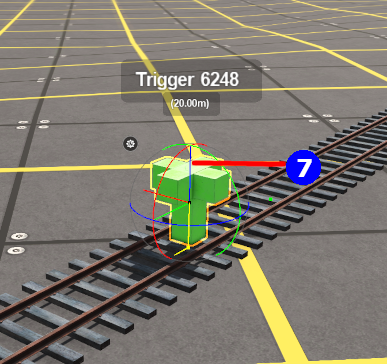 |
| Steps: To move a Trigger vertically:- |
 |
This option is only available with the Fine Adjustment Tool - the D key |
|
 |
Left Click and Drag Forward or Backward on the Blue Vertical Axis Line above the Trigger to it up or down |
 |
If you need to return the Trigger to its original position then:-
| Steps: To correctly reattach the Trigger to the track:- |
 |
select the object and open (Left Click on) its Context Menu Icon (or press the T key) |
 |
from the popup menu select Reattach to Track |
|
|
|
|
Move the Trigger Horizontally (S20)
| Triggers can be physically placed left or right alongside the track. This feature allows them to be placed, for example, beside the track so that they will not be hidden in Surveyor if a consist is parked on the Trigger. |
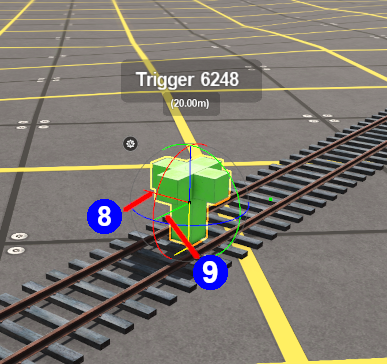 |
| Steps: To move a Trigger horizontally:- |
 |
This option is only available with the Fine Adjustment Tool - the D key |
|
 |
Left Click and Drag Forward or Backward on the Red Horizontal Axis Line attached to the Trigger to move it left or right |
 |
Left Click and Drag Forward or Backward on the Green Horizontal Axis Line attached to the Trigger to move it forward or back |
 |
If you need to return the Trigger to its original position then:-
| Steps: To correctly reattach the Trigger to the track:- |
 |
select the object and open (Left Click on) its Context Menu Icon (or press the T key) |
 |
from the popup menu select Reattach to Track |
|
|
|
|
 |
Notes:
The Green Horizontal Axis Line shown as  in the image pointing forward from the Trigger will move it forward/backward regardless of whether it is on the track or not. It has the same effect as in the image pointing forward from the Trigger will move it forward/backward regardless of whether it is on the track or not. It has the same effect as  Move a Trigger Along the Track. However, by using this tool it is possible to move the Trigger beyond the end of the track if that is ever required. Move a Trigger Along the Track. However, by using this tool it is possible to move the Trigger beyond the end of the track if that is ever required. |
|
Assign a Trigger to a New Layer (S20)
When a consist enters the Effect Radius of a Trigger it will create an "event" that can be detected and responded to by some Session Rules and some Driver Commands. One such rule is the Trigger Check Rule which is added to a Session in the  Session Editor. Session Editor. |
 |
More information on the Trigger Check Rule can be found on the Trainz Wiki Rules Page at:-
|
| Steps: |
 |
Open the Session Editor:
To add the Trigger Check Rule to a session:-
 |
Open the Surveyor Main Menu in TANE (shown below left) or the Surveyor Edit Menu in TRS19 and later Trainz versions (shown below right) |
 |
Select the option Edit Session from the drop down menu list |
|
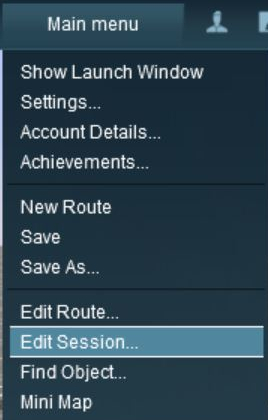 |
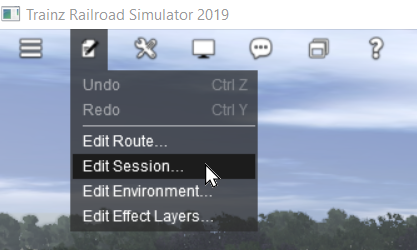
|
|
 |
Add the Trigger Check Rule: |
| |
 |
In the Edit Session window (shown below left) Left Click on the Add button |
|
 |
In the Rule Selection window (shown below right):-
 |
Scroll down the list to select the Trigger Check rule, and |
 |
Left Click on the  icon icon |
|
|
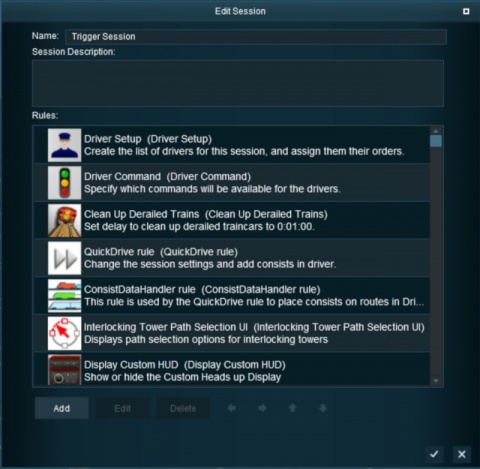 |
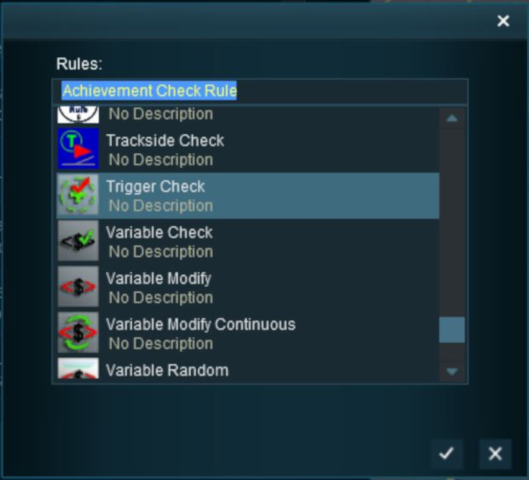 |
This will add the Trigger Check rule to the session. |
 |
Open the Trigger Check Rule Properties:
 |
With the Trigger Check rule highlighted (shown below) Left Click the Edit button. This will open the rule properties window
|
 |
|
 |
Configure the Rule:
|
Adding an Instruction to the Trigger Event
|
 |
|
 |
 |
 |
 |
Adding a Child Rule
To test your trigger event you will need to add some Session Rules.
| Steps: |
 |
Add A Message Popup Rule:
When you are back in the Session Editor window:-
 |
Make sure that the new Trigger Check Rule is selected (highlighted) |
 |
Left Click the Add button to add another new rule |
 |
Scroll down the rule selection window to find and select the Message Popup rule |
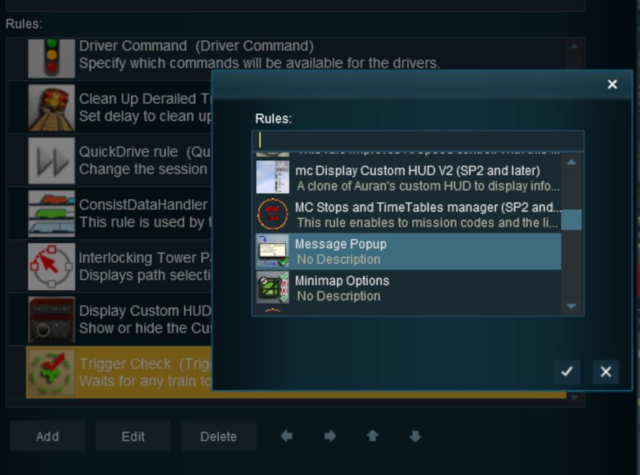 |
 |
Left Click on the  icon icon
|
| The Message Popup Rule should now appear directly below the Trigger Check rule. It will display a red cross because it has not yet been configured.
|
|
|
 |
Indent the Popup Message Rule:
The Message Popup Rule has to be indented so that it becomes a Child of the Trigger Check Rule and is controlled by that rule.
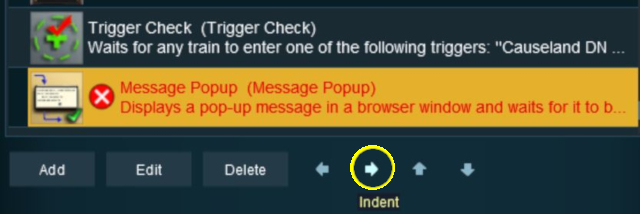 |
 |
With the Message Popup Rule highlighted Left Click on the Indent (right arrow) button. This should indent the Message Popup rule one level inwards (as shown below).
|
 |
The Message Popup Rule is now a Child Rule of the Trigger Check Rule and will only be executed after the Trigger has been activated by a train. |
|
Configuring the Message and Testing
|
 |
 |
|
|
|
|
| Steps: |
 |
Open the Message Popup Rule for Editing:
 |
With the Message Popup Rule highlighted and indented (as shown above) Left Click the Edit button. The Message Popup Rule properties window will appear (as shown below) |
|
|
 |
Configure the Message:
Set the properties as shown:-
 |
Check ON Close previous message popup windows |
 |
Select Option Button Custom text |
 |
Enter a short text message |
|
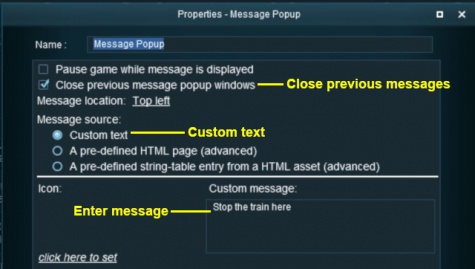 |
|
|
 |
(Optional) Add a Message Icon:
 |
Left Click the ; click here to set (shown left) and either:-
 |
Scroll down the Texture Asset Selection List (shown below) to find a suitable icon, OR |
 |
Simply type "icon stop" in the text box to use one of the builtin icons |
|
 |
Left Click on the  icon to select the icon icon to select the icon |
|
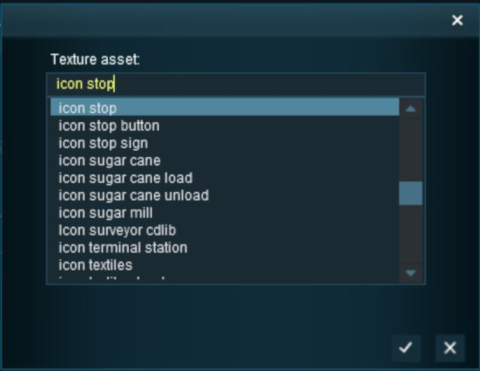 |
|
|
 |
Left Click on the  icon to exit the Message Popup Rule and return to the Session Editor icon to exit the Message Popup Rule and return to the Session Editor |
The completed Message Popup Rule
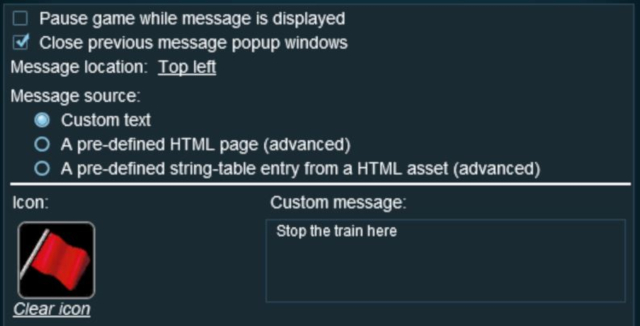 |
 |
More information on this rule can be found on the Trainz Wiki Page at:-
|
 Test the Trigger: Test the Trigger:
 |
Exit the Session Editor |
 |
Add a consist to your layout a short distance from the Trigger (but further away than its radius), save the Surveyor Session, and then test in Driver |
|
|
Another example of using the Trigger Check Rule can be found in the Trainz Wiki Page  How to Use Message Popup Rule (Applications).
How to Use Message Popup Rule (Applications).
Alternatives to the Trigger Check Rule
|
|
 |
 |
 |
|
 |
 |
There are other Session Rules that can be used in place of the Trigger Check Rule and Triggers. A few possibilities are listed below:-
 |
Directional Trigger Check Rule - identical to the Trigger Check Rule but adds the ability to test the train direction. Requires the use of a special Directional Trigger. For an example of its use see the Trainz Wiki Page  Controlling Signals in Sessions Controlling Signals in Sessions |
 |
Trackside Check Rule - very similar to the Trigger Check Rule but provides some different options |
 |
Navigation Points (see the How to Guides ; below) are more complex but provide more advanced controls and options |
 |
Multiple Resource Check Rule - monitors and acts on changes in multiple industry or multiple wagon resource (commodity) levels |
 |
Resource Verify Rule - monitors and acts on changes in a single industry or wagon resource (commodity) level |
 |
Timecheck Rule - triggers an event at a set time.
|
|
 |
There is a driver command that can be used in place of the Trigger Check Rule:-
 |
Wait For Trigger - forces an AI controlled train to wait until a specified Trigger has been activated by another train |
|
Trainz Wiki
 |
More Tutorials and Guides to Using Trainz
|
|
 |
Related Links
|
|
This page was created by Trainz user pware in May 2018 and was last updated as shown below.




In the Filter Palette either:-
In the Assets Palette to narrow down the filter list, type "trigger" (UPPER/lower case does not matter) in the Search Text Box

Place the Trigger on the track.
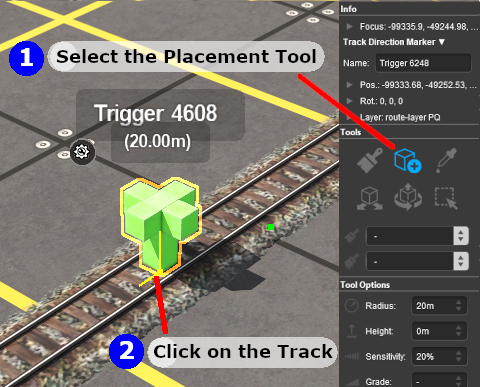





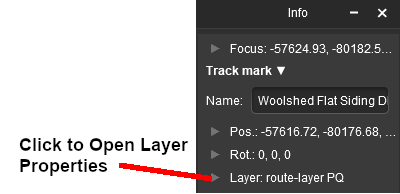
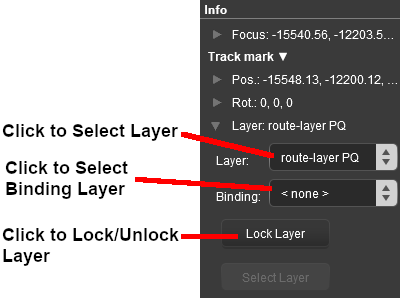





How to Use Message Popup Rule (Applications).





